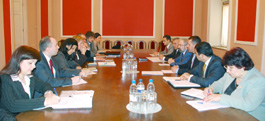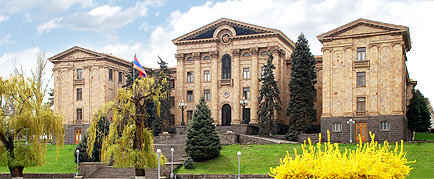On April 15 the Speaker of the National Assembly of the Republic of Armenia Mr. Tigran Torosyan met with the experts of the Venice Commission of the Council of Europe Ms. Finola Flanagan and Ms. Simona Granata-Menghini and experts of the OSCE/ODIHR Mr. Denis Petit and Mr. Neil Jarman.
At the centre of the discussion were the amendments adopted on 17 March 2008 in the RA law on Conducting Meetings, Assemblies, Rallies and Demonstrations. The meeting attended the Justice Minister of the Republic of Armenia Mr. Gevorg Danielyan, Assistant to the President of the Republic of Armenia Mr. Gevorg Mheryan, Special Representative of the Secretary General of the Council of Europe in Armenia Mrs. Bojana Urumova and other officials.
Welcoming the guests, the Speaker of the National Assembly Mr. Tigran Torosyan thanked the guests for the discussion of the law and ensured that Armenia respects the obligations undertaken while joining  the Council of Europe. Then, the Parliament Speaker informed the experts why and how the law of the matter of subject was adopted. Reminding that the mother law, as well as the remaining laws after the adoption in the first reading were permanently sent to the experts and adopted by the consideration of the recommendations of the conclusions made by the experts of the Venice Commission of the Council of Europe, as well as OSCE/ODIHR, the Speaker of the National Assembly noted that after the adoption of the law (28 April 2004) it was very well applied, and there was no discontent. But after the presidential elections one of the candidates, not agreeing with the outcome of the elections, without notifying organized assemblies for 9 days, which was rough violation of law. Afterwards the March 1 events took place, which are not fully presented. Meanwhile, the complete picture of what happened can only allow understanding why and in what conditions the amendments were made in the law, and what shall be changed today. Mr. Torosyan reminded that after 9-day illegal assemblies the police addressed the assembly organizers that there was information about the accumulation of the arms at the place of the assembly and wanted to make a search, as a result of which not a big clash took place, and the police freed the square. Then the events developed in another place, and violence took place: buses, cars were burned, metallic rods, 'Molotov cocktails' and grenades were used, vandalism was recorded – shoplifting, clashes took place between some part of demonstrations and police. Those painful cases recorded on the videotapes shocked the Yerevan citizens that a day ago could not imagine the possibility of such nightmare in their city, where since 1988 numerous multi-crowded assemblies had taken place without such consequences. 10 people, 200 wounded became victims of painful events, and the overwhelming majority were police and military people. According to the decree of the President of the Republic of Armenia, a state of emergency was declared, and amendments were made to the law, having the task to prevent any attempt bloodshed repetition. During the discussion of the amendments to the law it has already been noted in the parliament that it will be sent for conclusion to the experts, and what has been done. The Speaker of the Parliament noted that discussions will be held over 4 clauses received in the response. First question refers to the provision regarding the notification, according to which, in case of prohibition, a conclusion must be received from the police and national security bodies about existing prohibitions.
the Council of Europe. Then, the Parliament Speaker informed the experts why and how the law of the matter of subject was adopted. Reminding that the mother law, as well as the remaining laws after the adoption in the first reading were permanently sent to the experts and adopted by the consideration of the recommendations of the conclusions made by the experts of the Venice Commission of the Council of Europe, as well as OSCE/ODIHR, the Speaker of the National Assembly noted that after the adoption of the law (28 April 2004) it was very well applied, and there was no discontent. But after the presidential elections one of the candidates, not agreeing with the outcome of the elections, without notifying organized assemblies for 9 days, which was rough violation of law. Afterwards the March 1 events took place, which are not fully presented. Meanwhile, the complete picture of what happened can only allow understanding why and in what conditions the amendments were made in the law, and what shall be changed today. Mr. Torosyan reminded that after 9-day illegal assemblies the police addressed the assembly organizers that there was information about the accumulation of the arms at the place of the assembly and wanted to make a search, as a result of which not a big clash took place, and the police freed the square. Then the events developed in another place, and violence took place: buses, cars were burned, metallic rods, 'Molotov cocktails' and grenades were used, vandalism was recorded – shoplifting, clashes took place between some part of demonstrations and police. Those painful cases recorded on the videotapes shocked the Yerevan citizens that a day ago could not imagine the possibility of such nightmare in their city, where since 1988 numerous multi-crowded assemblies had taken place without such consequences. 10 people, 200 wounded became victims of painful events, and the overwhelming majority were police and military people. According to the decree of the President of the Republic of Armenia, a state of emergency was declared, and amendments were made to the law, having the task to prevent any attempt bloodshed repetition. During the discussion of the amendments to the law it has already been noted in the parliament that it will be sent for conclusion to the experts, and what has been done. The Speaker of the Parliament noted that discussions will be held over 4 clauses received in the response. First question refers to the provision regarding the notification, according to which, in case of prohibition, a conclusion must be received from the police and national security bodies about existing prohibitions.
The experts suggested that the person submitting the notification has the right to apply to the court and in short order receive the verdict of the court. A reference is made to the paragraph 3 of the Article 13. Regarding this, there is an opinion that 13-3 is spread on the prohibitions of the whole law, but if necessary the same can be repeated in the Article 9.
The second question refers to the terms of notifying: the Speaker of the National Assembly suggested leaving the discussion of that question till the final solutions are found, and after counting how much time is needed and fix that time.
The third question refers to the spontaneous assemblies. There is a concern that this mechanism will be speculated. 10, 50 or 100 people as if can start a spontaneous assembly, then they can make it mass assembly with the participation of the thousands of people. So, the problem refers not much to the spontaneous assembly, but to the prevention of its speculation, which will enable to separate the natural and artificial spontaneous assemblies. The Speaker of the National Assembly suggested finding right wording as a result of discussions or leaving the amendment made.
It was proposed to touch upon the clause 6 of the Article 9 that the experts as a whole propose to remove from the law.
Expressing her gratitude for the opportunity of discussions, the expert of the Venice Commission of the Council of Europe Ms. Finola Flanagan highlighted their necessity and the clarifications submitted by the Speaker of the National Assembly that will give opportunity to find more accurate solutions.
By mutual agreement the discussions over the law will continue in the National Assembly and after finding solutions a draft memorandum, which will be prepared, and then based on it the law will be sent to the Venice Commission of the Council of Europe and OSCE/ODIHR, and after receiving the response the draft will be discussed in the National Assembly and the amendments made will be adopted.




